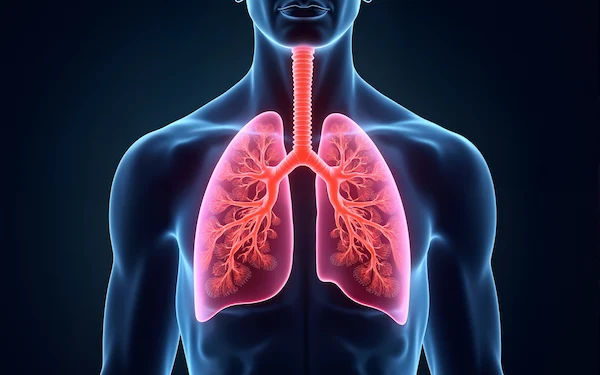Breathe Easier; The Essential Role of Diet in Lung Health
Discover how diet directly impacts lung health. Learn the best nutrients, foods to eat and avoid, and dietary tips for conditions like asthma, COPD, and post-illness recovery.

Written by Dr. Mohammed Kamran
Reviewed by Dr. Dhankecha Mayank Dineshbhai MBBS
Last updated on 13th Jan, 2026

Introduction
Every breath we take is a testament to the incredible work of our lungs. These vital organs work tirelessly, yet we often take them for granted until we face a problem like shortness of breath, a persistent cough, or a respiratory illness. While factors like genetics and environment play a part, the role of our daily diet and the specific nutrients we consume is profound in maintaining healthy lungs. Think of your food as fuel not just for your muscles, but for your entire respiratory system. The right choices can reduce inflammation, combat environmental damage, and strengthen your lungs' natural defences. This article will serve as your comprehensive guide, moving beyond simple food lists to explain the science of how key nutrients protect your lungs. We will explore the best foods to incorporate, what to avoid, and how to tailor your diet for specific conditions, empowering you to take an active role in your long-term respiratory wellness.
How Your Diet Directly Impacts Lung Function
Your lungs are in a constant state of interaction with the outside world, making them vulnerable to damage from pollutants, allergens, and pathogens. The food you eat provides the raw materials your body uses to repair this damage and mount a defence.
The Battle Against Inflammation and Oxidation
Two key processes that threaten lung health are inflammation and oxidative stress.
Inflammation is the body's natural response to injury or irritants. However, chronic inflammation in the airways can narrow them, increase mucus production, and lead to conditions like asthma and COPD. An anti-inflammatory diet helps to calm this response. Oxidative Stress occurs when there is an imbalance between harmful molecules called free radicals (from pollution, smoke, and normal metabolism) and antioxidants that neutralise them. This stress can damage lung tissue over time. A diet rich in antioxidants provides the necessary defence force.
Supporting the Immune System in Your Airways
The lining of your respiratory tract is your first line of defence. Adequate intake of certain nutrients, like Vitamin C and Zinc, is crucial for maintaining the integrity of this barrier and ensuring your immune cells can effectively fight off infections like bronchitis and pneumonia, which directly impact lung function.
Top Nutrients for Optimal Lung Health and Their Best Sources
To build a lung-supportive diet, focus on these key players.
Antioxidant Powerhouses: Vitamins A, C, and E
These three vitamins work synergistically to protect your lungs from cellular damage.
Consult a Dietician for the best advice
Vitamin A and Beta-Carotene: Guardians of Lung Tissue
Vitamin A is essential for maintaining the health of the epithelial tissues that line all our airways. Beta-carotene, which the body converts into Vitamin A, is a powerful antioxidant itself. A study published in the European Respiratory Journal found that high levels of beta-carotene were associated with better lung function.
- Best Sources: Sweet potatoes, carrots, leafy greens (spinach, kale), red bell peppers, cantaloupe.
Vitamin C: The Crucial Antioxidant and Immune Booster
Vitamin C is a potent antioxidant that concentrates in the lung fluid, directly combating inhaled oxidants. It also supports immune function and is involved in collagen production, which helps maintain the structure and elasticity of lung tissue. This is a key nutrient for lung repair after infection.
- Best Sources: Citrus fruits (oranges, grapefruit), kiwi, strawberries, broccoli, bell peppers, tomatoes.
Vitamin E: Protecting Cell Membranes from Damage
Vitamin E is a fat-soluble antioxidant that protects the delicate cell membranes of the lungs from damage caused by free radicals. It's particularly effective when working in tandem with Vitamin C.
Best Sources: Nuts (almonds), seeds (sunflower seeds), spinach, broccoli, plant-based oils (sunflower, wheat germ oil).
Magnesium and Potassium: Essential Minerals for Breathing
Breathing is a mechanical process reliant on muscles. Magnesium helps relax the bronchial muscles (the airways in the lungs), making it easier to breathe. Potassium is vital for proper nerve function and muscle contractions, including the diaphragm. An adequate intake of these minerals can be beneficial for those experiencing shortness of breath.
- Best Sources (Magnesium): Nuts, seeds, legumes, dark leafy greens, whole grains.
- Best Sources (Potassium): Bananas, avocados, tomatoes, spinach, beans.
Omega-3 Fatty Acids: The Anti-Inflammatory Champions
Omega-3s are renowned for their powerful anti-inflammatory effects. They can help reduce inflammation in the body, including the airways, which is crucial for managing chronic lung diseases. Replacing inflammatory fats (like those in processed foods) with omega-3s is a cornerstone of an anti-inflammatory diet for COPD and asthma.
- Best Sources: Fatty fish (salmon, mackerel, sardines), flaxseeds, chia seeds, walnuts.
Building Your Lung-Healthy Plate: A Practical Guide
Knowing the nutrients is one thing; applying them is another. Here’s how to build your meals.
Foods to Embrace: A Colourful Approach
Aim for a "rainbow" of fruits and vegetables to ensure a wide array of antioxidants and phytonutrients. Include fatty fish twice a week, a handful of nuts or seeds daily, and opt for whole grains over refined ones. Herbs and spices like turmeric and ginger also have potent anti-inflammatory properties. This approach is one of the best dietary tips for better oxygen levels and overall respiratory health.
Foods and Habits to Limit or Avoid
- Processed Meats: Foods like sausages and bacon contain nitrates, which have been linked to increased risk of COPD.
- Sugary Drinks and Foods: Excess sugar can exacerbate inflammation.
- Excessive Salt: High sodium intake can lead to fluid retention, which may worsen breathing in individuals with pre-existing lung conditions.
- Smoking and Vaping: This is the single most damaging habit for lung health.
Special Considerations: Diet for Asthma, COPD, and Post-Illness Recovery
While a general healthy diet benefits everyone, specific conditions may require tailored approaches.
- Asthma: Some individuals with asthma may have sensitivities to sulphites (found in dried fruits, wine) or salicylates (found in some fruits and vegetables). Keeping a food diary can help identify triggers. The emphasis should be on consistent anti-inflammatory foods.
- COPD: Patients often require more calories and protein to support breathing muscles. Small, frequent meals can prevent bloating that pushes against the diaphragm. If you have COPD and are struggling with dietary management, consulting a nutritionist via Apollo24|7 can provide personalised guidance.
- Post-Infection (e.g., Post-COVID): Focus on protein for tissue repair and a high intake of Vitamin C and Zinc to support immune recovery. Hydration is paramount to thin mucus.
Beyond Food: The Synergy of Hydration and Lifestyle
Diet doesn't work in isolation. Staying well-hydrated by drinking plenty of water is essential for keeping the mucosal linings in the lungs thin, which helps with clearing irritants. Furthermore, regular physical activity improves cardiovascular efficiency and lung capacity. Practices like diaphragmatic breathing can also strengthen respiratory muscles. If your condition does not improve after trying these methods, book a physical visit to a doctor with Apollo24|7 to rule out other underlying issues.
Conclusion
The journey to maintaining healthy lungs is powerfully influenced by the choices we make at every meal. The role of a strategic diet, packed with specific, protective nutrients, cannot be overstated. By understanding how antioxidants combat damage, how anti-inflammatory fats soothe airways, and how essential minerals support the very act of breathing, you can move from passive hope to active empowerment. This isn't about a restrictive regimen but about embracing a colourful, whole-foods-based way of eating that nourishes your entire body, with special benefits for your respiratory system. Start small—add a serving of berries to your breakfast, include a leafy green salad with lunch, or snack on a handful of nuts. Each positive choice contributes to the long-term resilience and health of your lungs, helping you breathe easier and live more fully for years to come.
Consult a Dietician for the best advice
Consult a Dietician for the best advice
Mrs Sneha P V
Nutritionist
10 Years • Master of science in Food and Nutrition
Bengaluru
Apollo Clinic, Sarjapur Road, Bengaluru

Ms. Soma Saha
clinical nutrition
17 Years • B.Sc. - Home Science (Food & Nutrition), M.Sc. - Home Science (Food & Nutrition)
Kolkata
Dr Utsa Basu Clinic, Kolkata
(50+ Patients)

Ms. Samapti Maity
Dietician
16 Years • MSc. (Clinical Nutrition & Dietitics), NDEP, Course in Maternal Infant Young Child Nutrition.Diploma in Sports Nutrition, Diploma in Diabetic educator, FODMAP Specialist
Kolkata
BIENETRE CLINIC, Kolkata

Ms. Sreeparna Dey Dhara Deb
Dietician
10 Years • DNHE
Bansdroni
Siddhita Healthcare., Bansdroni
Dr. Sasikamalam
General Practitioner
1 Years • MBBS
COIMBATORE
Apollo Sugar Clinic Coimbatore, COIMBATORE
Consult a Dietician for the best advice
Mrs Sneha P V
Nutritionist
10 Years • Master of science in Food and Nutrition
Bengaluru
Apollo Clinic, Sarjapur Road, Bengaluru

Ms. Soma Saha
clinical nutrition
17 Years • B.Sc. - Home Science (Food & Nutrition), M.Sc. - Home Science (Food & Nutrition)
Kolkata
Dr Utsa Basu Clinic, Kolkata
(50+ Patients)

Ms. Samapti Maity
Dietician
16 Years • MSc. (Clinical Nutrition & Dietitics), NDEP, Course in Maternal Infant Young Child Nutrition.Diploma in Sports Nutrition, Diploma in Diabetic educator, FODMAP Specialist
Kolkata
BIENETRE CLINIC, Kolkata

Ms. Sreeparna Dey Dhara Deb
Dietician
10 Years • DNHE
Bansdroni
Siddhita Healthcare., Bansdroni
Dr. Sasikamalam
General Practitioner
1 Years • MBBS
COIMBATORE
Apollo Sugar Clinic Coimbatore, COIMBATORE
More articles from Pulmonary Disorders
Frequently Asked Questions
What are the best foods to clean your lungs after quitting smoking?
Foods rich in antioxidants are key for lung repair after infection or damage. Focus on cruciferous vegetables like broccoli and kale (which may help activate detoxifying enzymes), berries, oranges, turmeric, and green tea. Hydration is also critical to help flush out toxins.
Can a specific diet cure asthma or COPD?
No single diet can cure chronic lung conditions. However, an anti-inflammatory diet for asthma patients or those with COPD can significantly help manage symptoms, reduce the frequency and severity of flare-ups, and improve overall quality of life. It should be used alongside prescribed medical treatment.
How does hydration specifically help lung function?
Water is essential for producing the thin, watery mucus that lines your airways. Proper hydration keeps this mucus fluid, allowing the tiny hair-like structures (cilia) to easily sweep away dust, allergens, and microbes. Dehydration makes mucus thick and sticky, impairing this cleansing process.
Are there any foods that are surprisingly bad for your lungs?
Highly processed foods, especially those containing sulphites (common in wine, dried fruits, pickles) can trigger asthma attacks in sensitive individuals. For some, dairy can temporarily thicken mucus, though it does not increase mucus production.
Is drinking coffee good or bad for the lungs?
In moderation, coffee can be beneficial. Caffeine is a mild bronchodilator, meaning it can open up airways slightly for a short period. Some studies have shown an association between coffee consumption and a reduced risk of asthma symptoms. However, excessive consumption can have other negative effects.
